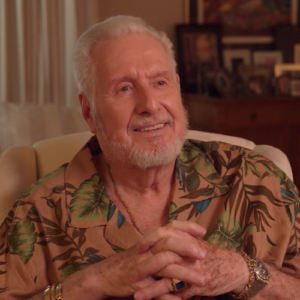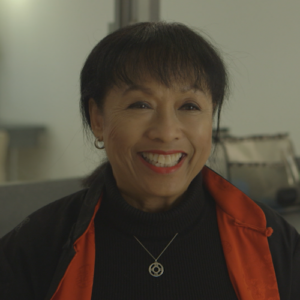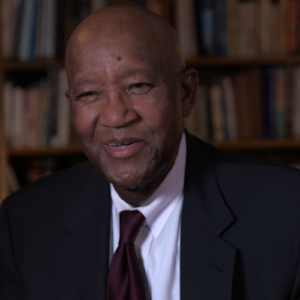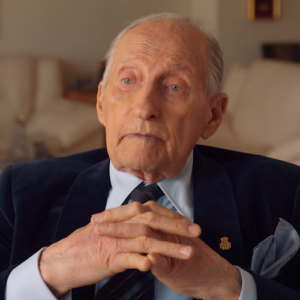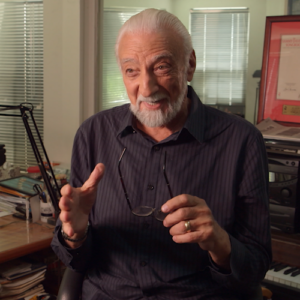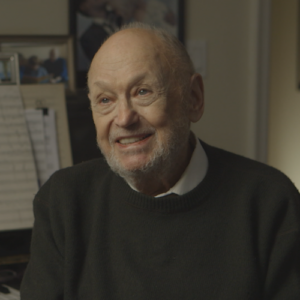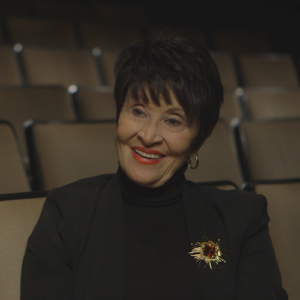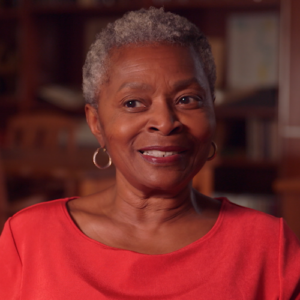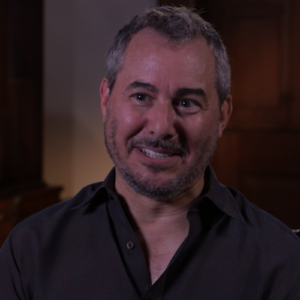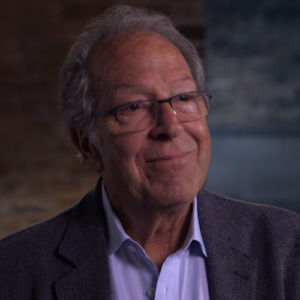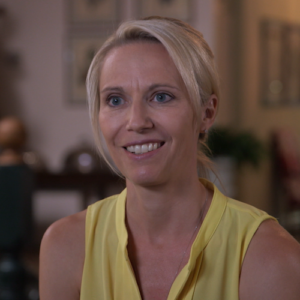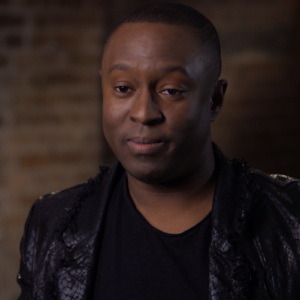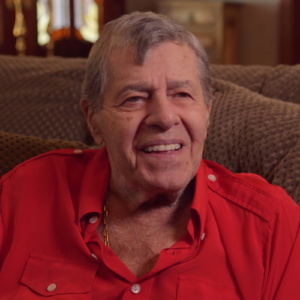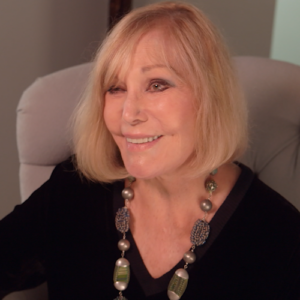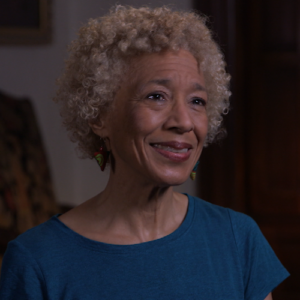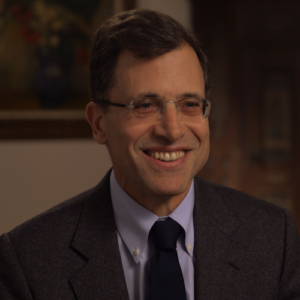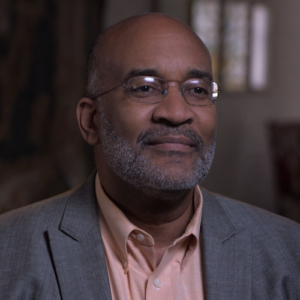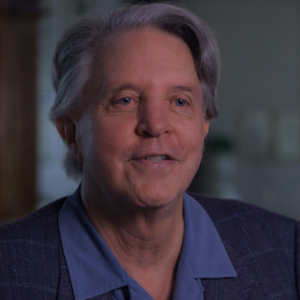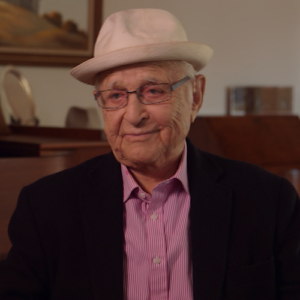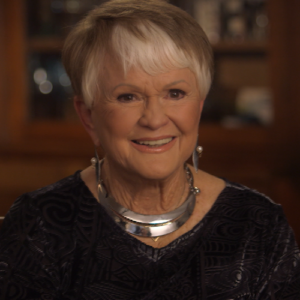Interviewer: So Billy, tell us the story.
Billy Crystal: So I met him before I met him. I was about to get married and I’m picking up my tuxedo in a shopping center called Roosevelt Field. Sammy was playing the Westbury Music Fair, so I knew he was in town, but I couldn’t afford to go to see him. And I had a kinship with him. One, I just thought he was the greatest talent ever seen. He was our Michael Jackson. Plus, he could do everything. And my uncle had produced some of his records, especially his first gold record, which was, Hey there. So I’m picking up a tuxedo on my intended wife and I there, and Sammy’s walking with George Rhodes, his conductor, right past us, and he’s wearing thigh high pirate boots with, like, patchwork leather, different colors. And he’s just walking through rows of film, people looking at him, you know, because you don’t see many guys wearing pants or thigh high pirate boots. And I fight. I got to talk to him. I got to say hello for my while. So he goes into a camera shop because he was a camera freak, as I would find out. And George Rhodes is standing outside and I introduce myself. I said, My name is and my uncle is Melnick, because I know Milt real well. Milt GABLER. Yeah. Producing I to. I’d like to say hello to Sam names. Go ahead. Say, open a door to the camera shop. Sammy is now behind the counter with the owner of the store talking about cameras, and he’s pulling and looking. And I just started like, a bit. I said, Excuse me. And they both turned around and I said, You know, my film was supposed to be ready on Tuesday and it’s now Friday and it’s not here. And Sammy, without missing a beat, goes, What’s the name? And it was like, Great. And then we both laughed and I introduced myself and it couldn’t have been nicer. It was like it was like, spectacular. So that was like 1969. So flash forward a bunch of years and I’m working with him and I’m his opening act and I really couldn’t believe it. And it was just truly like like being with a museum of show business every second. And I, I can’t tell you how much I, I hate the word adore, but I adored working with him.
Interviewer: So. So tell me about when you first saw Sammy and Mr. Wonderful. What was that like?
Billy Crystal: The first Broadway show I saw was Mr. Wonderful. It was Sammy’s first Broadway show. My father was friendly with a man named Doug Watt, who was a theater critic for the New York Daily News. So we had these great seats, and I’m guessing I’m five, six years old. Well, let me start by, sir. What year was it?
Interviewer: It was 57.
Billy Crystal: 57. So I’m not. Yeah, I saw it again. The first Broadway show I saw was Mr. Wonderful starring Sammy Davis Jr, Jack Carter and Lily Pons. See? Wow. This means a lot to me. My dad was friendly with a theater critic for the New York Daily News, a man named Doug Watt. And we had these great seats were actually in the front row. And I’m nine years old and. The lights go down. The music started. The overture. What a feeling. What a glow. Na na na na na na na na na na na. And then the curtains opened and he walked out. And the crowd went crazy. And I looked at him, and it was the first, you know, experience with seeing a star walk out on stage. It’s very different when a star walks out on stage. And he was very much a star. And he looked amazing. And he’s in a spotlight. I remember thinking I wanted that to be me. And that that excitement of seeing him just really was like, I still think about it. And I get excited about that. I saw him at such a young age. I also saw Mickey Mantle that year for the first time. And so I saw like these two giants at their peak of young stardom at spectacular moments. And so I’ll never forget that. And I told him that several times. And he always said that for him, the two kids were walking in a room and walking out. The rest is gravy. So I did come in and had to go out. The rest, you know, what to do. And it was pretty great.
Interviewer: So when you you talk, you just talks about the experience of meeting him. Yeah. The camera store. Yeah. You first. When did you encounter Sammy again? And how did it come about that you were opening that?
Billy Crystal: Okay, I get a job opening for Sammy in Lake Tahoe. We’re going to be there for a month together. And so my manager, David Steinberg, was Sammy’s PR man for a long time. And so this thing happened that we could work together. As Sammy called it, a charade, which is ghoulish from so well flying the night before. And Sammy wants to have dinner with me. And so we meet. And we talk. I talked to him about seeing him in a camera story. He said he remembered. He probably did. And we talked about what I was going to do and how long to do on his own is a Come on, come on, come on, come on. So we’re walking in the the bowels of the the Sahara Tahoe Hotel, and Sammy says, Follow the brown line. Just follow the brown line, because there’s these tapes on the floor that led to the elevator and the different colors for different, different members of the staff. And we follow the brown line to the elevator, took us up to his private suite that he had designed. But really, he designed this suite and it was like a James Bond suite. It was like, you know, snap your fingers. And then the movie projector comes down and covers up the bad picture of the of the wilderness kind of thing. And so he had cooked. He had cooked. He loved cooking soul food. And but what I thought was interesting because I was like, amazed that I’m going to open for him because this was this was Mr. Show business. Forget about it. He was amazing. He was lonely. He was all alone there. There was nobody else. He had this wonderful man that took care of him named Murphy. And but yet he was there alone in this huge suite. He had a collection of movies at that time. Was VHS upstairs, like hundreds of them. And a monitor that he would just sit alone and watch movies all night. He stayed up all night, slept during the day and got back and, you know, and to do the show. So he would get to opening night and I’m going to do 30 minutes and come out on stage. And now that was my only meeting with him. You know, that was it. That was like really the first time we met, you know, and talked. And it was and it was great. And I. I do my 30 minutes and I walked off and it went really well. Great crowds. And I walked off into the wings saying to myself, yes, I’m really in show business. I’m opening for Sammy. It was like a really big thing for me. It was like, exciting. He walked right out after me. There was no introduction. He didn’t need it. He walked right out and started telling the crowd a history of us that had never happened. And it was like, That was amazing. And he started talking to the crowd about, you know, last year when I had pneumonia and I was in the hospital in Reno, Bill comes to the hospital and holds up a sign, get well, Sam can’t can’t do it without you. That’s the kind of young man he is. APPLAUSE, applause, applause. Never happened. Second show, same night. I killed again in the wings. He does a completely different story about you. About me and how you know how close we were. And we’ve never worked together except for telethons. Never happened. So never happened. But it was fascinating. And it just pulled the crowd in even more. So I go out to this, the sound booth, and I said, Would you do me a favor? Would you record all of Sammy’s intros for me? It goes. Yeah, sure, sure. It was. It was lovely what you did from in the hospital. I sent you the. Thanks. There is a tape of all of these recordings. Every night. It was something different for the 20 something days. It was all spectacular, all interesting. I never could say to him, Why are you doing this? Because he loved doing it. It was like he created this whole wonderful world of the two of us that would later happen. So I just it was, like, hilarious to me.
Interviewer: That’s sweet.
Billy Crystal: Yeah. Yeah, It was very interesting. Yeah. Yeah. Oh, yeah.
Interviewer: How long would you stay as his opening act?
Billy Crystal: That was like that month. And I and we did a couple of more dates, and then I left to do Saturday Night Live, and. And so I didn’t work with him again. We always kept in touch. And then when I started, you know, imitating him, it happened there because Sammy would get down to the dressing room at like 5:00 for an 8:00 show that he’s on at 830. I started coming down at 515. I usually get there at 715, 730. You know, I need a half hour. My sound check is Hello. Okay, I’m fine. So I would hang out with him and we played backgammon a lot and we’d just talk about the business and we’d talk about life and we’d talk about his life. And it was amazing. And that’s where I started hearing him. And when you’re around him and you just can’t help but start to want to do him. He was so I don’t know what magnetic. And usually if I’m, you know, in those days when I was opening for somebody. I’d watch one show, two shows, and then that was it. I watched every one of his shows. I can’t. I’ve worked with so many great people. I’ve been around so many great people. Nobody comes close to the magnetism that this man had on stage.
Interviewer: Well, you’ve said he gave all he could do.
Billy Crystal: But it was astounding. Up close, up close. And I would watch from behind when he would do his Porgy and Bess medley and he’d become Sporting Life. And he’d sing. There’s a boat that’s leaving for New York and ain’t necessarily so. And then he’d sing Bess, who is my woman now? And I mean, he was a diminutive man, but a giant on the stage. But there was something from behind that watching this in the spotlight, which was like his life to me, you know, like, that was where he was happiest and most comfortable. I still like it, like goosebumps just thinking about that. I had a chance to be that close to it for, you know, for that long.
Interviewer: I mean, when I read both his books, Yes, I can. And the other one, you know, he always talks about after these shows, he’d have all these parties up at his dressing room every night.
Billy Crystal: He had a huge spread for the band. Everything was about the band. And it wasn’t just like he put it out and left. He’d stay and hang and then he’d be with, you know, everybody. And he’d talk about what was good, about the show band, about the show. Then he’d look at me and go, which meant, Come on, I’m going to go upstairs. And it was a little private little bar that we go up and just talk about whatever again. And part of it when, you know, when Al Davis wasn’t with him, he was lonely. And so I would, you know, stay with him one. I just loved being around him because he was he was like the coolest guy you could imagine. And. You with Sammy Davis Jr. You know, it’s like it’s it’s it’s I can’t even describe it because again. Been around all these people. He is a singular. Face on Mount Rushmore. To me, that that I’ve worked with.
Interviewer: Is also fascinating to me. SID You spending time with Sandy and basically you’re spending time with somebody and like you said, the museum. Yeah, you know, he can give you the history of coming up in the 2030s and the forties and fifties and what was it like. What did he tell you what it was like to have with his, with his uncle and his dad.
Billy Crystal: He tell me about the, you know, the road trips, the car trips, the difficulty of playing certain clubs because they were African-American, the the huge impact when it came out here. And Hollywood crowds started to find him. And here was he was this African-American entertainer doing imitations of white people and them loving. It was extraordinary to him. And that was amazing. And all of those stories, you know, were this wonderful stew that he cooked up, you know, for a life. I mean, it was this He tells his story. So we’re playing cards and bogeys and I’m like, Don’t you know? I’m listening to these Bowie stories. You know, we’re playing. Yeah. And so it’s main bogey, Gary Cooper and Sinatra is on his way over. He had just won the Oscar, you know, for From Here to Eternity. And he idolized Bogart, idolized him. So we’re smoking a couple of joints. I’m going to smoking a couple of joints with Bogart and Kerouac, and he starts riffing on Know Gary Cooper Stoned is amazing. I want something to eat. I’d like something to eat. So and this is what I’m telling you. This is word for word. So Bogart says, when Frank gets here, kind play a little trick on Frank know so. So Frank gets enlightened and he’s sort of full of himself. And he just wanted it was all. So we’re playing cards and so on. And Bogart looks at his cards and without missing a beat, looking up, says, You know, Frank, I know you won the Oscar, but I didn’t think the work was as good as it could have been. I’m going to take that cut. And Frank sort of like goes. Really? What? What do you think? Now, at the same time, he idolized him at the same time. Now he’s hating him. Well, I just thought you were, like, you know, indicating a little much was a little operatic for me. That’s the card I want. And Frank is, like, boiling up, and Cooper starts to laugh so hard, and we just giggled, and then we just said we were just kidding. We’re just kidding. But those are the kind of those are the kind of stories, you know? And it was it was truly amazing. And he talked a lot about my uncle, about how Milt was in the recording studio and helped him be a better singer that recognize that he was a singer and not just an impressionist, the tap dancer and so on and so forth. So those those things were amazing. And then closing night. Now, I’m usually so glad to end. And this was a long gig and I’m anxious to get home and move on to whatever next thing is. But I’ve loved every segment this. Sammy had a monitor on the stage that would help him with lyrics and things like that. So it was it was it was a video machine teleprompter. And it worked like a video machine. So I come out. It’s my closing night Celeste show. And Sammy only watch me except for opening night. The very last two or 3 minutes. He listened to everything and then he would walk right out on stage. So I’m out there and I hear him in the wings, like right from my opening, laughing and stamping his feet. Like it’s like you’ve seen he did do that. And I’m like doing my stuff and everything’s going great. And I look at him and he like, goes like this. And I look at the monitor and there’s a porno film on it. So disgusting, so graphic. And it kept playing throughout my entire act, and I just couldn’t say a word. I couldn’t look at it. I couldn’t check the time I had because I had it. You had to do a strict 30 minutes and it was a clock on the floor right next to it. And that was that was his closing night joke on me, man. It was it was it was really cool. And then, you know, we we got close enough that I could play jokes on him backstage at the at the at the hotel. There was a long staircase that led down to the dressing rooms were and Sammy had that buffet out. So I would I would take a big black olive that had little red pimento in it and I parchment in my hand and he like for me to meet him at the end of the show. So I’d say he said, How is that? And he call me Sir William. How was that, Sir William I went great show and I hit him on the back and I dropped the olive down the steps and I went, Oh, God, I’m so sorry. And and, you know, I was like, Let me get your eye. I’ll get your eye out. And he laughed so hard, and I would have the balls to do that. But so, you know, what can I tell you? This was. This was electricity. You know, he. He was so generous with young talent and so supportive of people and so optimistic that. At his age before he got sick, he said to me, I’m singing better than ever. I’m feeling better than ever. And he kept learning and kept wanting to do better. And I’d watch him in rehearsal. I was running through a new number, and if someone played something wrong, he would. Nobody was treated badly by him. He was he loved the guys and he was very innovative. And some of the numbers that he would do, like he would do a number only with drums. He had this guy playing drums and he’d sing a medley of Cole Porter songs night and day, to come back and check Got Bunk. You are the one you call about. You come back to Bump, Bump, and it was just amazing stuff that he would try.
Interviewer: Amazing talent.
Billy Crystal: Yeah.
Interviewer: As you said, he was a great impressionist. He could do everybody. Yeah. You know Jimmy Stewart, You’re an impressionist. What’s the skill you need to be such a real good impressionist?
Billy Crystal: You have to. I don’t do many people, right? I do. I loved him, and. And I. I got him. You know, here is this giant of a guy. Speaking Yiddish. You know, he had converted to Judaism and he he he had great knowledge. And he would talk to me like one of my uncles. And so when I came away from that night and I hosted Saturday Night Live. And I. There was a sketch that was written and I said I could play Sammy Davis Jr. In this piece. It was Sammy coming to summoned to the White House by Ronald Reagan, played by Joe Piscopo. And we had this the scene there, and he wanted me to go and hug Gary Hart. So it would like ruin Gary Hart’s campaign, I think was. I think that was what it was. But anyway. I can do the voice and I knew I could do him. And we were built kind of, you know, I was it was cool. So they designed a make up. I never had it on before. And I’m I just come out of a sketch where I played every village villagers in a sketch called Bad Career Moves. And and I’m under the bleachers, and we got we got, like, 3 minutes. That’s it to turn me into. Know the band’s plan. And now they’re stripping me down and putting the clothes on me and then painting my face in a gluing a nose on and putting a mustache on and and then putting rings on my fingers and then putting all this the thing, the color on my skin. And and Joe Dixon was the Senate live floor manager forever in the 30 seconds. I need him. Let’s go. And I can feel it, you know, And I went, Wait, wait, wait, wait, wait. What, what what do I look like? And I looked in the mirror and I just I just cracked up. I just got hysterical laughing. Oh, Jesus. And they light a cigaret and put it in my hand. And then I find myself, I’m walking like him. And then Joe Piscopo was Reagan. He’s got all the stuff on his face. And I goes, We’ll send in Mr. Davis. And I walk through the door and we just looked at we just totally laughed through the whole skit. It played really well. It was true. And the next day it was, you know, I hosted the show meant a lot to me. And my mother calls. She said you were terrific. But that that that Eddie Murphy is so wonderful that Sammy Davis Junior was so great. And I said, Mom, that was that was. It was me. Oh, come on. It was Eddie, I said. And I had to do Sammy on the phone for her to prove that it was it was me. So. So. So I hadn’t. And I’ve always felt bad about this. And I told them I felt bad that I hadn’t called him to say, Watch the thing. I’m going to do this if, you know, hope you’re cool with this. Right. And it was sort his permission. I probably should have done that. But I felt we were so close at the time. We’re like, so. Sammy calls the house. And on my phone machine, there was some jazz music and you heard, Hey, it’s me. I’m not home now. I’m at the studio grooving with the cats. Leave your name and number. I’ll get back to you. Peace and love And I mean that beep and you hear. What the hell is that? And it was Sammy called, Sammy answered, and he wasn’t happy with me. And he said, Listen, man, I’m just. It’s cool. I thought it was fantastic. I’m going to say it was great. But, you know, where are we going with this? So it’s like, well, I’m going to go right where it’s as a race. And then he came out on some award show, I think was the the Cable ACE Awards. And he came out and he said, Good evening. My name is Billy Crystal.
Interviewer: Sammy was also a pretty extravagant man. You know, he just seemed to spend money and he seemed to want to get people gifts all the time that come from religion, that comes from inside of Sammy.
Billy Crystal: I think it probably came from not having when you were a kid. And also just it’s a way of saying I love you. And so it was also maybe a way of keeping people closer, you know? He was a complicated guy in his dressing room. He had photographs that he had taken. He was quite a good photographer. You know, some beautiful photographs of Marilyn Monroe, Elizabeth Taylor, all these beautiful, really beautiful photographs. He was always like from that first time I met him and Roosevelt Field with the camera, with the lens, with that thing, you know, and. Complicated guy. I mean, to me, we were like, straight ahead. We really liked each other. I made him laugh. He always, you know, when I saw him, threw his arms around me and talked about me to other people in a really great way, how much he loved the, you know, my working with him. He loved the fact that my family was in the music business and that my house was was filled with these great jazz musicians when I was a kid. He trusted that that I grew up with with these great black jazz stars in the house. And he, of course, knew my uncle and knew of my father. And he he knew that I like got it. And and I think that, you know. That helped me at the time, which he dug, that I could do African-American characters with great respect and dignity because we loved them, because I got it. You know.
Interviewer: Was he still was he still on the from the books? When I read both books, he was still supporting both his uncle and his dad. You know, when he was in his in the sixties, they were not no longer part of the act. Right. He was still financially supporting them. Yeah. And to talk about that and.
Billy Crystal: He never talked about that stuff.
Interviewer: Because I know he had a complicated relationship with Marston.
Billy Crystal: With the uncle there with well, and and complicated with his dad. His father came to the two watches in Tahoe one night. And the night before, Sammy was nervous that that he was coming. And he told me that he was coming. And he introduced his dad from the stage. And again, I’m backstage watching. And there was a booth in the back of the the room that had lights on it. So he it would light up for any celebrity that would come to see the show. So Sammy introduces his dad as. The ultimate cat. My father. Sammy Davis, Senior. Cut to the lights, go up in the booth, the old man stands up. There’s like a little tap kind of move and blows me kiss. Sammy catches it and is about to start the next song when someone in the audience yells, Get him up there. Sammy snapped. Got really angry with this guy, got in this guy’s face, wherever the guy was, and. Said, don’t talk about him that way. Get him up there. I mean, he just took real umbrage with this and said, he doesn’t owe you anything. You know, what is it? You know, get up. And and he just really ripped this guy right up and down. And I’m not sure it really was about the guy. I’m not sure. And it was mesmerizing. And I mean, he’s on stage for about 2 minutes and he finishes the rant with this guy and then says, okay, now how do we proceed from here? And this turned around and then they wanted to some whatever song it was, that was one that was chilling.
Interviewer: It was like it was, yeah. What did he say about his relationship with Sinatra?
Billy Crystal: Okay, you got me talking. Marty Short and I go to see Sammy at the Greek Theater. He’s opening for Frank. Sami destroys. I mean, he was so great. So great. And Marty and his wife, Nancy and Janice and I sitting there and he’s like, he was unbelievable and he totally destroyed you. It’s a big crowd. It’s like, I don’t want a 12,000 people outside or whatever. And he sings the Porgy and Bess medley, and it’s devastating. I mean, it’s so great. So then there’s an intermission and Mr. Sinatra comes on and he’s having it. He’s having a little tough time with the crowd. I mean, Sammy really killed them. And Mr. Sinatra, I’m calling him that because you never know where he is. Wasn’t wasn’t sharp. And he’s he starts to do a song and he stops and he tells Frank Jr, let’s skip to the what I want to do. Skip to the one I want to do. And he’s edgy and he decides. He announces he wants he’s going to sing the soliloquy from Carousel. So it was.
Interviewer: A.
Billy Crystal: Competition. So Marty and I look at each other and go. How long do you think Let’s have a bet, how long the soliloquies are going to last, What he calls 9 minutes. I call 11 and he starts singing the soliloquy. And it wasn’t it wasn’t great, but it was this competition. And Sinatra, it was not one of his great nights. But still, it’s you know, I just go back to the house. Sammy invites us to the house and. We said to him. You were unbelievable. I said. I’ve never seen this before, man. But they said the old man couldn’t follow you. Anyone. They said I was good tonight. And he was. And he said, But you know what? I’m. I’m a little bugged. I was. I asked them. I asked them to come and break the Yom Kippur fast with me and he didn’t show up. That’s an important day for our people. And and he should have come. And he was so mad that that Frank didn’t come to his house to break the Yom Kippur fast. I mean, you know, it was like it was so but it was it was probably more than that. I don’t think, you know, he got the right treatment sometimes. I’m not based on any fact, but that’s the feeling I got. It was a feeling I got that it was sort of not an equal relationship.
Interviewer: Did he ever talk to you about the years when Sinatra was in the Rat Pack, especially around JFK and the Kennedy?
Billy Crystal: Did that stuff didn’t come up? No. He would talk about some of the parties in Palm Springs and that kind of stuff, but he didn’t talk about any of those things. And then he also I had not heard those Rat Pack recordings. Where you want to say, Why did you take this? You know it different times, though. You know, it was different times that was was part of the part of the thing. He was a good sport about it. But, you know, you could you could say that wasn’t why you’d have to go that far. Right. Didn’t have to go that far when.
Interviewer: You were around. Did you think once when Sandy McCord, that picture of Sammy hugging Nixon?
Billy Crystal: Well, so we go upstairs and sit with Marty since Sammy had a fireplace that was, like, turned into an aquarium. It was like almost two stories high. And his house across from Pike Fair, and it was filled with piranha. And they’re swimming around. And I said, It’s a semi. They all look like you guys, you know. And he, like, laughed so hard. Come on, let’s go upstairs. So his his staircase winds up and there’s this little card room and was lined with guns. There were all kinds of guns up there. And he said, let me. I want to. There’s a there’s a pretty good bottle of wine on again in the other room when he opened the door. Hanging on the wall was the big picture of him hugging Nixon in front of the big crowd. But it wasn’t in the main room anymore. It was. It was in a little. Yeah.
Interviewer: Yeah. You always saw that great story about you and Sammy at a delicatessen. We the sandwich is named after.
Billy Crystal: Oh, no. When Joe was on Deli was. Yeah. Yeah. No. So this happened. It happened to me. It’s happened to other people. We were at dinner at a place called Rex. And he’s looking at the menu and can make up his mind in a way that says what we have is just I’ll have the chicken named after me. But, you know, when I just back, how many people have a chicken named after him?
Interviewer: It’s really not many a at all. Do you think even Sammy was a performer who was so worried that if he didn’t have this talent, he wouldn’t have been anybody?
Billy Crystal: I think he was one of those performers that was worried that if I didn’t have all of his gifts, who the hell would I be? And I think that actually. Factored into his into his choosing not to have surgery when he got sick. I was hosting the Oscars and I said good night to him. Turner took a moment during the show to wish him well and. He I got a message from him that, you know. Of thanks. And then. And then I saw him. And I was. Would be the last time I saw him. And we talked about. Why don’t you do the surgery? That old. And he said, Who would I be? Who would I be? And there were mounting bills. There was all kinds of taxes and estate troubles and money owed. And I think he decided. What can I do? I can’t sing. And then I can’t be me. It’s the opposite of the song. I can’t be me. And so I think that was that was part of why he said, I’m out of here. Right. That’s my feeling.
Interviewer: That is love.
Billy Crystal: Yeah. Yeah. Before it got really bad and Gregory and I. Greg in high grain. Gregory Hines and I. I went to the funeral. And. There was a moment. That was so interesting to me. Because he was the he was the first of the pack to to die. And they walked in together. Frank Dean, Shirley MacLaine. And they sat like a couple of rows in front of us, and they all looked so sad for the first time. It’s coolest guys in the world. Looked like older men. And they were. They was. They weren’t that image then that you think you know. And I found that kind of profound. I remember like go tearing up about, you know, that. And then Gregory had had a moment was with Sammy. And since Greg’s not here, I can. I can tell it. That he it goes to Sammy and it’s and it’s Sam is really in bad now and couldn’t talk very well and Gregory said what he wanted to say to him. And at that point, you know, besides, Sammy Gregory was the greatest tap dancer in the world. And Gregory goes to leave and is all busted up. And it turns back to look at them and Sammy mimes having a ball and he throws it to them and Gregory caught it and he goes, We talked about that at the funeral. And. It was it was it was so powerful a moment, you know, because I remember when there was a big special honoring Sammy. And Gregory got up and danced. And Gregory was a very different kind of tap dancer than than Sammy was. Gregory was a muscular, athletic. Nicholas brother kind of for the future. You know, at that point, he was like, he was so great and innovative and then he gets Sami up to dance with them. And. Sammy was not well and he’s unbelievable. The rhythms, the math of what goes on in a genius brain is beyond any of our comprehension. When they when when you think of rhythm that way and it just flows. What? What is that? Where does that come from? It’s not taught. It’s. It just is. And then it’s practiced and honed and improved and becomes this incredible statement of. Of who you are. I have watched that recently and it’s still it still kills me how great he was because I I’m one of the lucky ones. You know, I saw it up close right now and at. It was it was insane. It was just insane how great it was. Those guys are once in a lifetime. There’s no one else who’s ever come close to what he can do on stage. You know, no one with the versatility.
Interviewer: You know, the multi-talented.
Billy Crystal: Multi-talented.
Interviewer: Dance act. You know, he was everything, Sammy.
Billy Crystal: He’d do this act and he’d sing great and and do these impressions, and then he’d do fast, draw like a Western with guns and do all this kind of stuff that he could do. And then he’d pull a sword out and he’d do the speeches from zero to bajrang. My nose, I magnificent my nose when it bleeds the Red Sea. He would do all of these things and people go, Where did this come from? You know what? How did he absorb all of these things and express it in such an amazing way? I mean.
Interviewer: What do you think in today’s performance take away from someone like Sammy Davis and does he have any airs?
Billy Crystal: There are people want to look at. They’ll give you a little flashes of him. Bruno Mars reminds me of Sammy, the way he moves. And if there was a Sammy musical, I’d say you should play him. There’s that about him. And it’s a so of a different time, but so spectacular and it’s in its. I don’t even know what to say. It was he was a wonderful, wonderful one of a kind comet that flew past the Earth way too quickly. You know.
Interviewer: I mean, you realize he died so young, you know. What do you think now, when people talk about Sandy, they talk about, you know, the fact that he was owed money to the IRS, he was into the drugs, he was into that. You know, there’s all these other things they say about Sandy DAVIES now and they forget the great performer that he was the way that up watching.
Billy Crystal: Yeah, that kind of stuff. You know, when when that stuff overtakes the talent of the man and the measure of the the performer doesn’t matter. Now, you know, that was in, you know, because he was so generous with people to a fault that he gave away all of his money that it didn’t have. I mean, that’s happened to so many people that you could just start naming people. I hated that. If I hate the people, I shouldn’t say hate. I feel sorry for people that didn’t get to see him, that didn’t think of him in the wrong way. Uh, you know it at his core. He’s is one of the great geniuses. Of the stage. I mean, it really is. And there’s such a unique blend of of. Of talent and. Insecurity and anger and perseverance. What he went through to get to where? You know, being accepted. His romance with with Kim Novak. All that’s. All of that stuff at that time. You know, it was kind of shocking. He you know, I got to be me. That’s why I’m that’s who I am. That’s how I am. And you know.
Interviewer: What the last man is for me? Sammy walking down the street in Vegas at the end of Ocean’s 11 singing EO 11, and you see him with the cigaret in his hand, his time walking down the street by the last one of the group.
Billy Crystal: Of the group.
Interviewer: You know, that’s the image that I think.
Billy Crystal: Yeah. He’s he was really one of the cool guys here. He was. And you know. Listen. Not now. I’ve been around a long time, and I met a lot of supposedly cool people. This was the coolest guy. So I get it. I get an offer to open for Sammy at Harrah’s in Lake Tahoe. It’s like 1983, and we’re going to do a month together. Two shows a night. No time off. Boom. And I couldn’t believe it. I mean, it was like, so cool. And so I fly in the night before and we have dinner together. And I met him backstage. He had settled his dressing room. He had hung all his pictures. He made the dressing room, his home, and there were beautiful photographs that he had taken of, like Elizabeth Taylor and Marilyn Monroe, James Dean. I mean, the cat knew everybody and were walking in the hallway. And I remember he was wearing like a cape. It was like a it was like a Sherlock Holmes kind of cape. It was weird because it was the summer and I went and he turned to me and I’m following him and I’m just like, This is the same way I followed him in Roosevelt Field when he went to the camera store and he turns, says and always follow the brown line. There were tapes on the floor that led to different parts of the the bowels of the hotel, which led us to this private elevator, took it up to the to the suite, which was he had designed. And it was like a James Bond suite. I mean, it was basically he’d do that and the screen would come down and cover up, you know, the bad Grand Canyon picture. And then, you know, it was like it was amazing. And it was also like 98 degrees. It was really hot. He liked it very hot. And then on the second floor, he had turned his bedroom into a kitchen because he loved to cook and was making soul food. And he had all these videotapes on a table every every movie could possibly imagine. And he was cooking up this big pot of stuff. And he put a bandana on his head and he just. And is he stirring this? But I’m telling you, chicken feet are like going around the pot. And I know I’ve got to eat this stuff. And he’s making greenhouses. And I never had that food before. But, you know, my grandmother boiled the chicken until it had no flavor. But this stuff is going on and it put it on here. Go ahead. And I just sort of nibbled at it. And he said, What’s the matter, pal? You’re not into greens. Oh, man. And then opening. That was the next night. And that was that was that was pretty great.
Interviewer: But okay, that’s great. Yeah.
Billy Crystal: That was over the chick. Oh, no, it’s totally true. It’s totally true.


